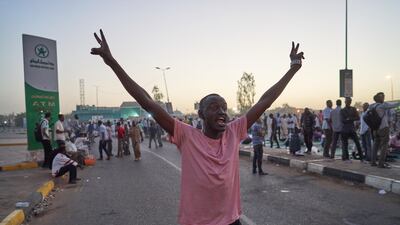The US on Wednesday urged Sudan's transitional military council to move quickly towards a civilian-led government after last month's overthrow of President Omar Al Bashir.
US Deputy Secretary of State John Sullivan called Sudan's military leader, Gen Abdel Fattah Al Burhan, to support "the Sudanese people's aspirations for a free, democratic and prosperous future".
Mr Sullivan pressed for an agreement with the Alliance for Freedom and Change protest group, the State Department said.
But the alliance expressed concerns about the military dragging the process out.
"The military council's response is moving in the direction of extending the negotiations and not in the direction of a transition," it said.
On Tuesday, the military council said the alliance had remained silent on its proposals on ensuring that Sharia remained the bedrock of Sudanese legislation.
The protest leaders said the generals "raised irrelevant issues including the language and sources of legislation in a tedious repetition of the biddings of the former regime".
"We call on the military council to reach an agreement to transfer power," they said.
The Alliance for Freedom and Change is made up of political groups, leaders and activists, several of whom want to build a new, secular Sudan.
The military council said on Tuesday that if the deadlock with protest leaders was not broken then it had the option of calling for elections in six months.
"It's an attempt to legitimise the regime," protest leader Madani Madani said, indicating that such an election could mean the return of previous regime figures.
Thousands of protesters have been camped outside the sprawling military headquarters in central Khartoum since April 6.
Initially they gathered there to seek the army's support in removing Mr Al Bashir from power.
But now they continue to hold their sit-in against the military council, demanding that it step down and transfer power to a civilian authority.
The military wanted a two-year transition period as opposed to four years proposed by protest leaders.
The council was says that declarations of emergencies should be in the hands of a sovereign, authority rather than the Cabinet sought by protest leaders.
But those leaders insist that their key demand remains the same – a full transfer of power to civilians.

